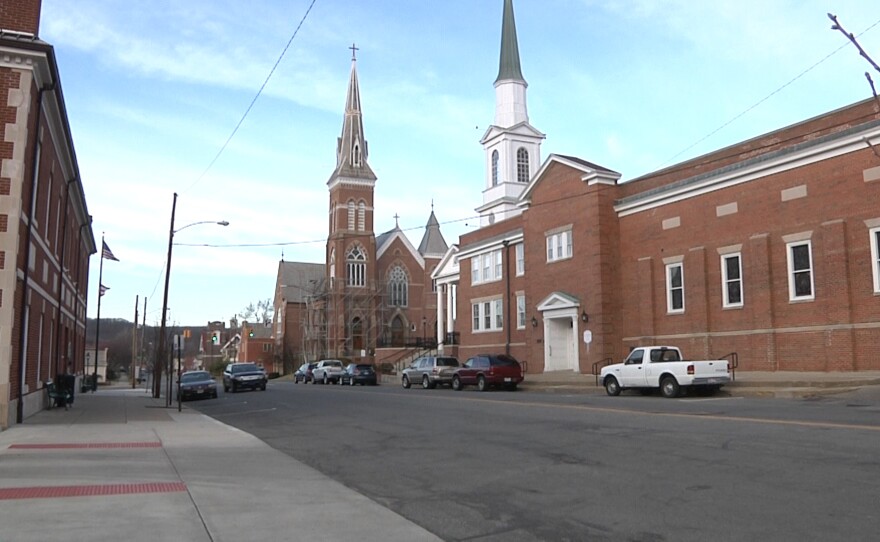A book released on ValentineŌĆÖs Day is a bit of a bittersweet love letter from its author to its subject ŌĆō his hometown. And the story it tells has been heard in towns all over Ohio and across the country.
Brian Alexander is a native of Lancaster, 30 miles southeast of Columbus. In 2008, his mom wanted make a hometown visit from Florida, where she lives in retirement. Alexander traveled to Lancaster from his home in California to meet her. While she lunched with friends, he walked around what he remembered as a bustling town and saw a closed-up glass factory, silent streets and deserted parks.
ŌĆ£IŌĆÖd been looking at a number of threads running through America that I found disturbing and trying to figure out a coherent way to write about them. Time went on and I started to follow events in Lancaster over the years, and I thought ŌĆō wait a minute. This is my hometown. The threads are really running through the middle of my hometown.ŌĆØ
AlexanderŌĆÖs visit nearly a decade ago lit the spark that became ŌĆ£Glass House: The 1% Economy and the Shattering of the All-American TownŌĆØ. He says he moved back to Lancaster for a year to write the book, which explains the impact of Anchor Hocking, founded in 1905. It was LancasterŌĆÖs leading employer with 5,000 workers, and the foundation of community leadership and investment by the company, its executives and their families. The book seeks to critically examine the devastation starting in 1987, when Newell Company acquired Anchor Hocking in a hostile takeover, fired the executives and cut jobs. Over the years the historic company was split up and sold off.
ŌĆ£I think the community has spent 30 years coming back from that. ItŌĆÖs been an uphill struggle. DonŌĆÖt forget, we also are just seven or eight years out of the worst economic collapse since the Great Depression.ŌĆØ
In 1979, before the Newell acquisition, the US Census reported a poverty rate in Lancaster of just under 10%. Now more than a fifth of LancasterŌĆÖs residents live in poverty. The opiate crisis in Lancaster was such a concern that Fairfield County was the first in the state to start an opioid task force. The Public Children Services Association of Ohio says 85% of the reason children are removed from their parentsŌĆÖ custody in Fairfield County is substance abuse and dependence.
And this story of major employers departing because of outside business moves and communities falling into economic and social trouble isnŌĆÖt rare in Ohio. ItŌĆÖs happened in Wilmington, Marion, Steubenville, Lorain, Lima, and Portsmouth just to name a few.
ŌĆ£ItŌĆÖs almost as though we were sleepwalking through the last several decades not to have noticed this.ŌĆØ
Former state lawmaker John Begala studied this s called ŌĆ£ŌĆØ. It looked at 47 communities, including Lancaster. It found that people in these communities are less healthy and more likely to be disabled than other Ohioans, and the teen birth rates in these towns are nearly double the statewide rate. Begala says whatŌĆÖs happened and keeps happening in these towns is significant.
ŌĆ£Keep in mind, the vast majority of people in Ohio live in places like that. And helping them have their voices heard to deal with the issues that theyŌĆÖre facing ŌĆō and itŌĆÖs not just economic development. YouŌĆÖve got all the other things that go with economic decline. ItŌĆÖs going to take some public investment. Most importantly, itŌĆÖs going to take rebuilding civic capacity in these towns and investing in them.ŌĆØ
Begala suggests historical tax credits from the state to help create ŌĆ£courthouse squaresŌĆØ to bring retailers and businesses back to downtowns. And he says public investment is necessary to battle the addictions that have gripped people who use drugs to escape the depression they see around them.
In Lancaster, while thereŌĆÖs still a drug problem, the population has grown 2.5% in the last five years, and Fairfield CountyŌĆÖs unemployment rate is below the statewide average, though Brian Alexander notes rampant complaints about underemployment in low-wage jobs. Alexander admits he was worried about the reaction to the unflinching way he tells LancasterŌĆÖs story in his book, because he knows what many think of this town.
ŌĆ£I think that thereŌĆÖs a great civic pride in Lancaster. People love Lancaster, people who live here love it.ŌĆØ
And people are interested, if AlexanderŌĆÖs hometown book signing was any indication. The room at the library in Lancaster where it was held was filled to capacity, and he sold all the books he brought with him.






